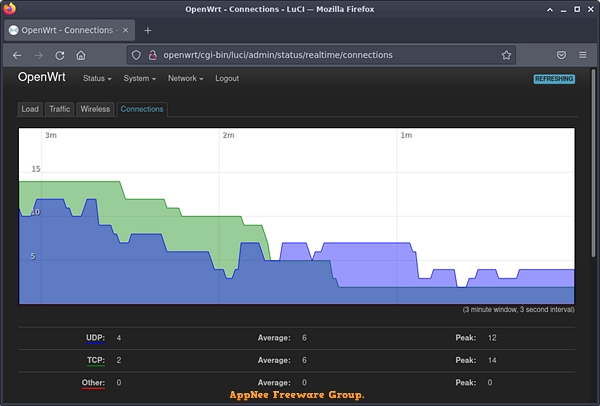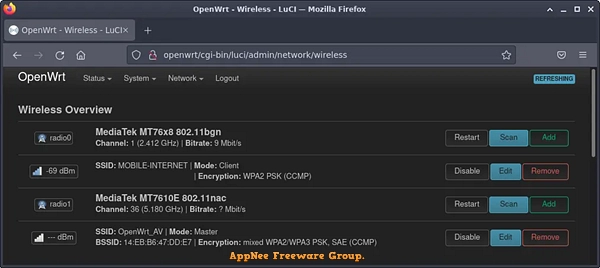| Ⅰ | This article along with all titles and tags are the original content of AppNee. All rights reserved. To repost or reproduce, you must add an explicit footnote along with the URL to this article! |
| Ⅱ | Any manual or automated whole-website collecting/crawling behaviors are strictly prohibited. |
| Ⅲ | Any resources shared on AppNee are limited to personal study and research only, any form of commercial behaviors are strictly prohibited. Otherwise, you may receive a variety of copyright complaints and have to deal with them by yourself. |
| Ⅳ | Before using (especially downloading) any resources shared by AppNee, please first go to read our F.A.Q. page more or less. Otherwise, please bear all the consequences by yourself. |
| This work is licensed under a Creative Commons Attribution-NonCommercial-ShareAlike 4.0 International License. |

OpenWrt (short for Open Wireless Router) is an excellent open-source embedded operating system based on Linux, and primarily used on home routers to route network traffic. It can run on various types of embedded devices, including CPE routers, residential gateways, smartphones, pocket computers. It is also possible to run OpenWrt on personal computers and laptops.
Linksys was acquired by Cisco and released the WRT54G series of wireless routers in 2003, and in the same year it was discovered that its IOS (Internetwork Operating System) was based on Linux. And Linux is released under the GPL license, under which Cisco was supposed to make the source code of WRT54G’s IOS public. The same year, Cisco was forced by public pressure to make the source code of WRT54G open. Since then, there have been many third-party router firmwares (to enhance the original functionality) based on this source code, and OpenWrt is one of them.
The OpenWrt project started in 2004, and its first version was based on the source code provided by Linksys and the Buildroot project in uClibc. In 2005, after Linksys started charging for its code, it switched to using the Linux kernel, used Buildroot2 as the core technology, completely modularized OpenWrt, constantly released patches and drivers, and added a large number of free tools. Its main highlight is its high scalability and fully writable file system, so that developers don’t have to recompile after every change, instead just compile their own packages, thus speeding up the development.
As a fully-featured, easy-to-modify router operating system written from scratch, OpenWrt is highly modular and automated, takes up little disk space, offers tens of thousands of optional software packages, supports a variety of processor architectures, and has powerful network components. There are only four types of popular router firmwares: DD-WRT, Tomato, OpenWrt, and Padavan. Many home routers have OpenWrt in them, i.e., they are based on OpenWrt for secondary development.
In addition to the traditional router uses, there are hobbyists and commercial projects using OpenWrt in many areas such as smart home master control devices, robotics, aerial vehicles, industrial control devices, VoIP devices, etc. To be more specific, OpenWrt can do everything a router can do. In addition, it can also perform advanced functions such as: being a USB camera, mounting a mobile hard drive/flash disk, BT download, using a phone card to access the Internet, single number multi dialing, remote control with a bound domain, Samba/DLNA home NAS sharing, private cloud sync, FTP server, personal website/server, etc.

// Official Demo Video //
// Related Links //
- OpenWrt Supported Devices
- OpenWrt Quick Start Guide
- OpenWrt User Guide
- OpenWrt Developer Documentation
- OpenWrt F.A.Q.
// Download URLs //
| License | Version | Download | Size |
| Freeware | Latest |  |
n/a |
| If some download link is missing, and you do need it, just please send an email (along with post link and missing link) to remind us to reupload the missing file for you. And, give us some time to respond. | |
| If there is a password for an archive, it should be "appnee.com". | |
| Most of the reserved downloads (including the 32-bit version) can be requested to reupload via email. |